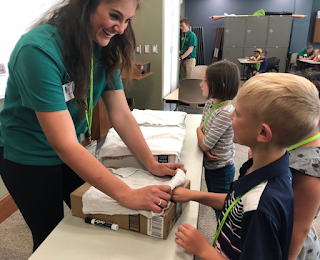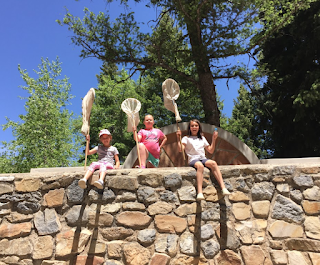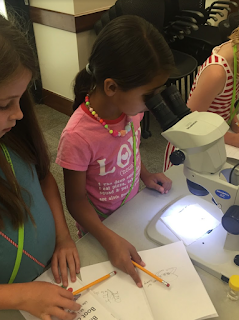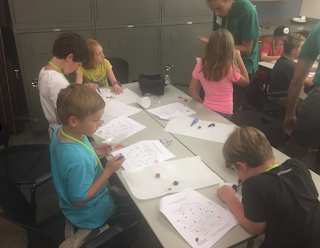With summer just around the corner, the Monte L. Bean Life Science Museum is proud to
announce the return of its four popular summer camp programs: Critter Camp, Junior
Naturalists, BYU Museums Camp, and Biology Boot Camp. Each camp provides an
interactive learning environment for a variety of ages, and focuses on different aspects of
the natural world and the sciences that study them. Information about each camp is listed
below.
Critter Camp is a program geared towards youth in kindergarten and first grade. The camp
meets for three weeks in June on Tuesdays from 12:00 PM to 2:00 PM, and Thursdays from
12:00 PM to 4:00 PM. Thursdays include a field trip! Each week focuses on different
critters: the critters of the land, the critters of the water, and the critters of the air. You may sign
up for only one week, or all three weeks depending on availability.
Week 1 of Critter Camp runs June 4 & 6, where children will learn about land critters.
Week 2 of Critter Camp runs June 11 & 13, where children will learn about water critters.
Week 3 of Critter Camp runs June 18 & 20, where children learn about air critters.
In past years, camp participants learned how animals navigate their environment with their
senses through interactive activities and games, visited outdoor sites like Cascade Springs,
met live animals, and created animal crafts.
The cost for each child per week is $50. Reservations for Critter Camp can be made here.
Junior Naturalists is a partnership camp with the Monte L. Bean Life Science Museum and
Thanksgiving Point Institute. This program is 4th and 5th grade aged youth, and runs from
June 24-28. The camp runs from 9:00 AM-3:00 PM from Monday through Friday. Participants
learn exactly what it takes to be a scientist out in the natural world. Throughout the week,
the participants spend time at the Bean Life Science Museum and Thanksgiving Point as they
learn to collect, record, prepare, and identify various plant and insect species, as well as share
their scientific findings with the public.
To view the cost of the program and make reservations, click here.
The BYU Museums Camp is intended for youth ages 11-15. This program has two
opportunities for sign ups. The first runs from June 10-13 from 9:00 AM to 3:30 PM. The
second runs from June 17-20 from 9:00 AM to 3:30 PM. Lunch and snacks are provided for
this camp. The BYU Museum Camp takes youth that are interested in museums and their
corresponding careers, archaeology, anthropology, biology, art, and paleontology through the
various BYU museums found on campus. Throughout the week, they will learn through
activities and presentations about curation, collecting and research, education and outreach,
as well as other aspects of the museums. Activities include viewing live animal shows, working
on design and building challenges, helping paleontologists in their lab, and curating displays.
The cost is $159 and reservations can be made here.
Biology Boot Camp is a program geared towards youth in 2nd through 5th grade. The
camp meets for three weeks in July. Unlike Critter Camp, each week will cover the same
material, which means a child only needs to attend one week to experience the full camp.
It runs Monday through Friday from 10:00 AM to 3:00 PM. Field trips are included on
Wednesday, Thursday, and Friday, which includes a trip to Hogle Zoo! Throughout the week,
participants will learn about the different groups of living things that make up our world,
including plants, insects, mammals, reptiles, amphibians, birds, and fish. The youth will learn
through games, activities, projects, and even special behind the scenes tours of the museum’s
research collections.
Week 1 of Biology Boot Camp runs from July 8-12.
Week 2 of Biology Boot Camp runs from July 15- 19.
Week 3 of Biology Boot Camp runs from July 29- August 2.
The cost of the camp is $150 a person and reservations can be made here.
We are very excited to host and educate the youth that come to our camps this summer. Many
adventures await them! For more information about the camps, please visit our website at
mlbean.byu.edu. Act fast! Spots are filling up quickly!
If you would like more information about all of our upcoming events and programs, subscribe to our mailing list here.





 On a more random note, we stopped by a Canyon Wall that has preserved Native American paintings from before-Christ times, and while I have no idea what any of the paintings meant, it was spiritual in its own way, and even brought tears to my eyes. All surrounded by incredible wildflowers and complete silence, as it's so isolated from everything.
On a more random note, we stopped by a Canyon Wall that has preserved Native American paintings from before-Christ times, and while I have no idea what any of the paintings meant, it was spiritual in its own way, and even brought tears to my eyes. All surrounded by incredible wildflowers and complete silence, as it's so isolated from everything.






























